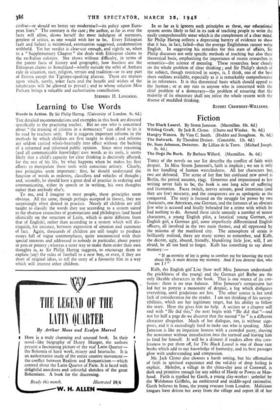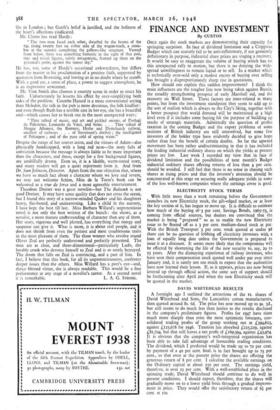Fiction
The Black Laurel. By Storm Jameson. (Macmillan. 10s. 6d.) The Dogs Do Bark. By Barbara Willard. (Macmillan. 8s. 6d.)
THREE of the novels on our list describe the conflict of faith with despair. In Miss Storm Jameson's, faith is implicit ; we see it only in her handling of human wretchedness. All her characters but. two are defeated. The scene of her fine but confused new novel is Berlin, the period autumn, 1945. Generous and impassioned as her writing never fails to be, the book is one long ache of suffering and frustration. Faces twitch, nerves scream, good intentions (and they are few) miscarry, and the conquerors are as apologetic as the conquered. The story is focused on the struggle for power by two characters, one American' one German, and the fortunes of an obscure Jew who is accused and finally beheaded for a crime with which he had nothing to do. Around these circle uneasily a number of minor characters, a young English pilot, a fanatical young German, an English girl, a German girl, some imperfectly differentiated English officers, all involved in the two main themes, and all oppressed by the miasma of the mutilated city. The atmosphere of strain is brilliantly realised, there are many scenes to remember, and Kalb, the decent, ugly, absurd, friendly, blundering little Jew, will, I am afraid, be all too hard to forget. Kalb has something to say about memory :— " If an eternity of joy is going to comfort me for knowing the truth about life, it must destroy my memory. And if you destroy that, who am I ? "
Kalb, the English girl* Lise (how well Miss Jameson understands the prickliness of the young) and the German girl Barbe are the only likeable characters in the book. That is one source of its con- fusion : there is no true balance. Miss Jameson's compassion has led her to portray a monotony of despair, a fog which disfigures everything, until gradations are lost. The other source is her total lack of consideration for the reader. I am not thinking of his suscep- tibilities, which are her legitimate target, but his ability to follow the story. Here she gives him no help. A section or a chapter will end with "He did this," the next begin with "He did that "—and not for half a page do we discover that the second " he " is a different character altogether. Much of her dialogue, too, is without sign- posts, and it is exceedingly hard to make out who is speaking. Miss Jameson is like an impatient hostess with a crowded party, shoving the newcomer without introduction into the turmoil and leaving him to fend for himself. It will be a disaster if readers allow this care- lessness to put them off, for The Black Laurel is one of those rare books which add to our knowledge of humanity, and its best passages glow with understanding and compassion.
Mr. Jack Clemo also chooses a harsh setting, but his affirmation of faith in spiritual experience and the validity of deep feeling is explicit. Meledor, a village in the china-clay area of Cornwall, is dark and primitive enough for any addict of Hardy or Powys or Man- hood. Faith is typified by Garth, a young clay-worker : unbelief by the Welshman Griffiths an embittered and middle-aged rationalist.
Garth believes in Irma, young evacuee from London. Malicious tongues have driven her away from the village and report ill of her
life in London ; but Garth's belief is justified, and the holiness of the heart's affections yinaicated.
Mr. Clemo has read Hardy:
"The two men faced each other, dwarfed by the beams of the tip, rising twenty feet on either side of the wagon-track, a cross- bar at the summit completing the gallows-like structure. Viewed from below, there was something fantastic in the sight of that pair, tiny and trivial figures, subtly antagonistic, framed up there on the pyramid's point, against the sunset sky."
He has, too, some of Hardy's occasional awkwardness, but differs from the master in his proclamation of a positive faith, supported by quotation from Browning, and leaving us in no doubt where he stands. With a good ear, a sense of place, a power to suggest atmosphere, he is an impressive newcomer.
Mr. Vian Smith also chooses a country scene in order to enact his faith. Unfortunately he lessens his effect by over-simplifying both sides of the problem. Coombe Hazard is a more conventional setting than Meledor, the talk in the pub is more decorous, the folk kindlier: and even though Ruth has a terrible cast in her eye, she has a beautiful soul—which causes her to break out in the most unexpected ways : "They talked of music, and art and pickled onions of Pierlugi da Palestrina, Leonardo da Vinci, and brine. . . . They talked of Meggie Albanesi, the Romney, Hythe and Dymchurch railway, smallest of railways . . . of Stevenson's donkey ; the intelligence of Pekingese ; and of the pure cold of spring water."
Despite the range of her conver,ation, and the virtues of Adam—also physically handicapped, with a long red nose—the story fails of conviction because the message is always liable to be more important than the characters, and these, except for a few background figures, are unskilfully drawn. Even- so, it is a likable, warm-toned story, and many readers will get a quiet enjoyment from it. And from Dr. Sant Johnson, Detector. Apart from the one objection that, where we have so much fact about a character whom we love and revere, we may not welcome fiction, Miss de la Torre's book can be welcomed as a tour de force and a most agreeable entertainment.
Theodore Dreiser was a great novelist—but The Bulwark is not good Dreiser. It may have some quality that does not cross the ocean, but I found this story of a narrow-minded Quaker and his daughters heavy, flat-footed, and uninteresting. Like a child in the nursery, I have kept the best till last. Miss Barbara Willard's unpretentious novel is not only the best written of the bunch : she shows, as a novelist, a more mature understanding of character than any of them. Her story, vigorous and well plotted, has everything that energy and suspense can give it. What is more, it is about real people, and it does not shrink from even the pettiest and most troublesome traits in the most pleasant of them. The three women who revolve round Oliver Zeal are perfectly understood and perfectly presented. The men are as clear, and three-dimensional—particularly Ludo, the lovable crook who devotes himself to Zeal and is so sorely betrayed. The doom that falls on Zeal is convincing, and a part of him. In fact, I believe that this book, for all its unpretentiousness, confronts deeper issues than the others. Miss Willard has a poet's eye—and, thrice blessed virtue, she is always readable. This would be a fine performance at any stage of a novelist's career. As a second novel



































 Previous page
Previous page